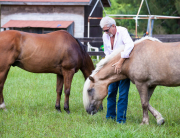The emotional growth that people experience with equine therapy occurs much more rapidly than it does with most other types of therapy, so this makes equine therapy especially useful for treatment of addiction, learning problems, behavioral problems or autism.
A mental health professional and a certified Equine Specialist conduct equine therapy together, although frequently a single individual holds both credentials.
The therapist introduces the patient and the horse, and the patient conducts a series of activities designed to build a close nurturing relationship with the horse and to provide insight into the patient’s relationships and behavior with people.
The Benefits of Equine Therapy for Addiction Treatment
Practitioners credit equine therapy with creating the following positive outcomes in many patients:
• Self-reliance
• Confidence
• Respect for personal boundaries
• Decreased feelings of isolation
• Improved impulse control
• Understanding of oneself and others
• Improved communication
• Improved ability to trust
• Better perspective on problems and life issues
• Self-acceptance
• Better social skills
• A deep spiritual connection
Horses have an innate sensitivity and responsiveness to the moods of the people caring for them. Aggressive behavior around horses results in nervousness and fearfulness in the horse, so people soon learn to use a more reasoned approach to build rapport and achieve better results.
Equine Therapy & Emotions
Equine therapy is especially beneficial for people who have trouble expressing their emotions or being in touch with their feelings.
Working with the horses helps patients bring their negative emotions to the forefront, and to work them out in a positive way.
Equine therapy may be the therapy of choice in activities where the patient helps people to understand how their own behavior affects their relationships with others.
For example, in one common equine therapy exercise, the patient must get a horse to move in a certain direction without touching it.
They quickly learn that no amount of yelling or wild gesturing will cause the horse to move, and the patient comes to understand that yelling and aggressive behavior is not a good way to get anyone to perform a specific behavior.
Building self-respect, learning to care for a dependent animal, and forming relationships built on trust are positive outcomes of equine therapy.
The therapy may or may not include riding the horse, but it nearly always includes feeding, grooming and caring for the horse’s needs. Some people scoff at equine therapy, saying it is simply recreation, but solid research supports equine therapy’s positive outcomes.
Download the Full Equine Therapy & Addiction Treatment Guide
Studies on Equine Therapy
A recent study from Washington University on the positive effects of equine therapy on children with cerebral palsy showed marked and sustainable improvement in stability and range of motion in the study participants.
Dr. Colleen Dell from the University of Saskatchewan showed positive anecdotal results in treating adolescent solvent abusers with equine therapy.
The patients exhibited positive personality traits including increased learning abilities.
Equine therapy requires a skilled therapist, and several organizations offer certification in the discipline.
EAGALA Certification
The most well-known organization for equine therapy certification is EAGALA (Equine Assisted Growth and Learning Association), a non-profit devoted to ensuring that every individual has access to equine Assisted Therapy and equine Assisted Learning.
EAGALA members live and work worldwide, bringing the benefits of equine therapy to patients who need it.
EAGALA certification requires completion of two 3-day workshops and the submission of a professional development portfolio. Other organizations, including NACPET (National Association of Certified Professionals of Equine Therapy) and the Equine Facilitated Mental Health Association (EFMHA) also offer respected certifications.
Learning More About Equine Therapy
In the coming days, we will learn about more benefits of equine therapy, how equine therapy works in addiction treatment, and the history of the therapy. In the meantime, you can download the entire Equine Therapy & Addiction Treatment eBook here.



